Multi-Hazard Mitigation Council
The Multi-Hazard Mitigation Council brings together a body of experts in a multitude of related fields that address the challenges associated with identifying and implementing effective mitigation and community resilience practices.
The work of MMC has informed thousands—perhaps tens of thousands—of mitigation decisions that led to effective public policy on many levels. Its goal is simple: promoting disaster resilience, while becoming a focal point of credible information and whole-building strategies that strengthen individual buildings, businesses, communities and the nation.
Hazard mitigation only works when implemented, and there are a number of real-world barriers to implementation. A large part of the council’s mission is to identify how to reduce or eliminate these barriers when developing the best possible mitigation strategies, measures, and policies.

Disaster Resilience
To bring together a body of experts in a multitude of related fields that address the challenges associated with identifying and implementing effective mitigation and community resilience practices
Information Hub
To inform the industry, government, and general public on mitigation decisions that lead to effective public policy on many levels
Whole-Building Strategies
To research and promote whole-building strategies that strengthen individual buildings, businesses, communities and the nation
Members
MMC membership is voluntary and includes public and private sector architects, engineers, contractors and risk assessment practitioners.
Officers
Chair
Dr. Anne Cope
Chief Engineer, IBHS
Vice Chair
Russ Strickland
Secretary
Natalie F. Enclade, PhD
Member at Large
Alice Yates
Director of Government Affairs, ASHRAE
Immediate Past Chair
Sara Yerkes
International Code Council (retired)
Chair of Committee on Finance, Insurance, and Real Estate
Daniel Kaniewski, PhD
Board of Directors Liaison
Yvonne Castillo
Victor, Boulder, CO
Staff Lead
Jiqiu (JQ) Yuan, PhD, PE, PMP
Vice President, Engineering, National Institute of Building Sciences
Committee on Finance, Insurance and Real Estate (CFIRE)
The Committee on Finance, Insurance and Real Estate (CFIRE) examines the intersection of finance, insurance, investment and design, construction and ownership to encourage the development and assist in the affordability of high-performance buildings. Banks, insurance companies, appraisers and real estate firms all play a significant role in how such buildings are procured, designed and constructed. How these different segments evaluate the risk associated with particular projects, technologies and practices can have an enormous impact on whether a specific idea gets the funding and insurance needed to move forward to fruition. However, banks, insurance companies, appraisers and real estate firms often lack the necessary data to support building industry efforts to go beyond "business as usual." CFIRE works to address these challenges by promoting a cooperative process and open dialogue among the different parties to support the achievement of cost-effective high-performance buildings.
Chair of Committee on Finance, Insurance, and Real Estate
Daniel Kaniewski, PhD
Managing Director, Public Sector, Marsh McLennan
CFIRE Steering Committee
Timothy Judge
Michael Newman
Senior Director, Law and Public Policy, IBHS
Bill Garber
Cassandra Skidanov
Natalie Enclade
Jamie Woodwell
NIBS STAFF LEAD
Jiqiu (JQ) Yuan
Chief Resilience Officer & Head of Engineering, NIBS
-
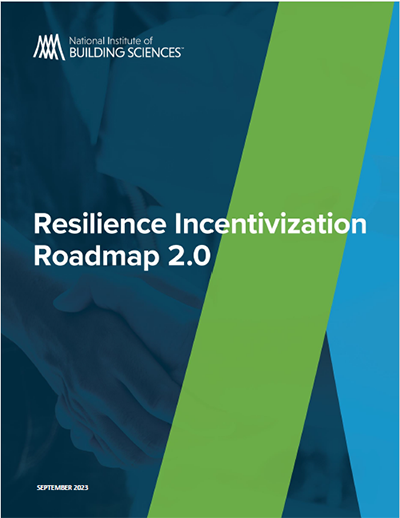 With the support of Fannie Mae, the National Institute of Building Sciences has developed a roadmap on mitigation investment to help Americans and the nation’s built environment prepare for and respond to the devastating effects of extreme weather.View (Sep 2, 2023; 150 pgs)
With the support of Fannie Mae, the National Institute of Building Sciences has developed a roadmap on mitigation investment to help Americans and the nation’s built environment prepare for and respond to the devastating effects of extreme weather.View (Sep 2, 2023; 150 pgs) -
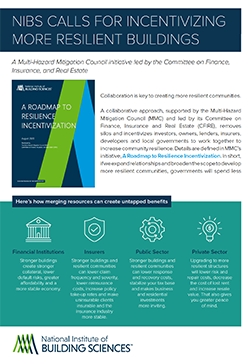 A collaborative approach removes silos and incentivizes investors, owners, lenders, insurers, developers and local governments to work together to increase community resilience.View (Dec 1, 2020; 2 pgs)
A collaborative approach removes silos and incentivizes investors, owners, lenders, insurers, developers and local governments to work together to increase community resilience.View (Dec 1, 2020; 2 pgs)
Reports
-
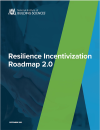 View (; 150 pgs)
View (; 150 pgs) -
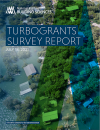 The MMC conducted a national survey to solicit feedback on the development of a National Mitigation Resource Portal. This report summarizes some of the key findings in four areasView (; 20 pgs)
The MMC conducted a national survey to solicit feedback on the development of a National Mitigation Resource Portal. This report summarizes some of the key findings in four areasView (; 20 pgs) -
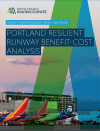 Oregon could experience a magnitude-8.7 or larger earthquake within 50 years that causes catastrophic deaths and damage. Portland International Airport (PDX) can play a crucial role speeding the…View (; 134 pgs)
Oregon could experience a magnitude-8.7 or larger earthquake within 50 years that causes catastrophic deaths and damage. Portland International Airport (PDX) can play a crucial role speeding the…View (; 134 pgs) -
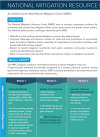 The National Mitigation Resource Portal (NMRP) aims to enhance community resilience by convening and streamlining mitigation efforts across government and private sector entities.View (; 1 pgs)
The National Mitigation Resource Portal (NMRP) aims to enhance community resilience by convening and streamlining mitigation efforts across government and private sector entities.View (; 1 pgs) -
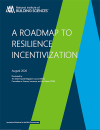 This document proposes to develop and demonstrate a set of public and private incentives to owners of buildings and other infrastructure to facilitate the upgrade of existing infrastructure and…View (; 33 pgs)
This document proposes to develop and demonstrate a set of public and private incentives to owners of buildings and other infrastructure to facilitate the upgrade of existing infrastructure and…View (; 33 pgs) -
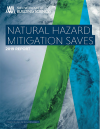 The Natural Hazard Mitigation Saves: 2019 Report represents the most exhaustive benefit-cost analysis of natural hazard mitigation, from adopting up-to-date building codes and exceeding codes to…View (; 619 pgs)
The Natural Hazard Mitigation Saves: 2019 Report represents the most exhaustive benefit-cost analysis of natural hazard mitigation, from adopting up-to-date building codes and exceeding codes to…View (; 619 pgs) -
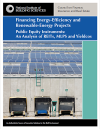 View (; 56 pgs)
View (; 56 pgs) -
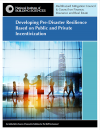 View (; 62 pgs)
View (; 62 pgs) -
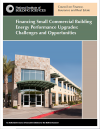 View (; 40 pgs)
View (; 40 pgs) -
 From 2000 to 2005, the MMC, commissioned by the Federal Emergency Management Agency (FEMA), conducted a Congressionally mandated independent study that demonstrated that for every public dollar spent…View (; 401 pgs)
From 2000 to 2005, the MMC, commissioned by the Federal Emergency Management Agency (FEMA), conducted a Congressionally mandated independent study that demonstrated that for every public dollar spent…View (; 401 pgs)
Mitigation Saves
$100 billion of average annual loss: The National Oceanic and Atmospheric Administration (2020) reports U.S. historical catastrophe losses showing that over the last five years, the nation has averaged 14 floods, wildfires, and other disasters each costing more than $1 billion and costing America on average $106 billion annually.
6%: U.S. disaster losses are growing about 6% per year, 10 times faster than the population.
$520 billion: Price tag to implement cost-effective resilience measures for private sector buildings. (This does not include the trillions of dollars needed to upgrade the nation’s D+ infrastructure.)
13:1: Mitigation Saves up to $13 per $1 Invested.
Should you have any additional questions about the Multi-Hazard Mitigation Council or would like to know more about the council's activities, please contact:
Staff Lead
Jiqiu (JQ) Yuan, PhD, PE, PMP
Executive Director, Multi-Hazard Mitigation and BSSC
National Institute of Building Sciences

Companies & Organizations

Subject Matter Experts & Participants







